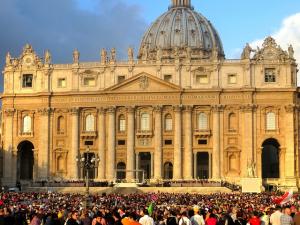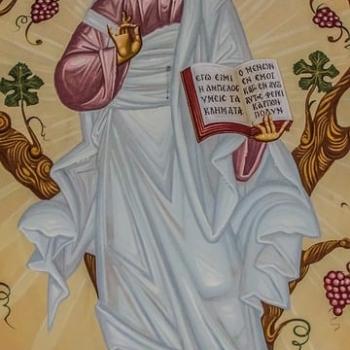
By no lesser authority than Thomas Aquinas, theology has been called the queen of the sciences. Why did the angelic doctor think this to be the case, and what exactly is theology?
In this paper, I will seek to explore what theology is and the four types of theology common in the Catholic Church.
Before commencing, it should be admitted that, in some sense, theology has had to sink to the level of the modern era. For most of human history, the existence of God and Divine revelation were on par with Aristotle’s first principles. That is to say that theologians did not need to spend time proving the existence of God, His existence being assumed by anyone willing to contemplate creation.
The acceptance of God and Divine revelation as nearly self-evident meant that theologians focused on understanding God, not defending His existence. A skeptical and myopic culture has changed that. The result is that theology has taken on the responsibilities of apologetics.
What Is Theology?
So that we may see theology as the “queen of the sciences,” we must provide a definition of science. Prior to the enlightenment, the sphere of science was much more expansive. For Aristotle and Aquinas (and western philosophy in general), the definition of science involved the systematic study of causes. Since God is the cause of creation, theology, as the study of God, is understood as the “queen of the sciences.”
As for theology, Saint Augustine provided the essential definition of theology, calling it “reasoning or discourse about the divinity.” Thomas Aquinas would wed theology and science by arguing that theology investigates faith by means of reason. From the perspective of epistemology, it is possible to identify two forms of coming to knowledge of God. They are natural theology and supernatural theology.
Natural theology refers to obtaining knowledge of the existence of God, as well as specific attributes associated with God. This was accomplished by observation of the world of nature and by the light of natural reason. Supernatural theology refers to truths obtained by Divine revelation and grace.
Having provided an overview of theology as a science, I will now examine the four types of theology common in Catholicism.
Systematic Theology
Catholic systematic theology undertakes the task of a comprehensive and synthetic understanding of the Christian faith as mediated through the Scriptures and the Catholic tradition and interpreted by the conciliar and papal magisterium.
As the name implies, systematic theology endeavors to organize the various subjects and teachings of the Bible. For example, interspersed throughout the Bible are moral instructions. A systematic theological approach would seek to collect and formulate all the moral education and beliefs referred to in the Bible into a system of moral theology.
As such, systematic theology concerns itself with such issues as Christology, Soteriology, Trinitarian Theology, Mariology, Ecclesiology, Theological Anthropology, Grace, and Eschatology.
Biblical Theology
Biblical theology involves the systematic exposition of the teachings of the Bible. Within the subset of biblical theology exists two forms. The first place stress on dogmatics. It works through the material furnished by exegesis. It then seeks to correlate ideas with facts by synthesizing them based on a principle consistent with their nature and respective value. Lastly, this form seeks to place them into the context of historical revelation.
The second form of biblical theology sees the development of exegesis into theology as the work of reason enlightened by faith. Its purpose is to enter into more intimate contact with transcendent reality as revealed in the sacred text.
The two forms of biblical theology, as auxiliary to dogma and as an instrument to religious insight, are not incompatible. They are mutually conducive to heightening the value of Scripture and doctrine by integrating two areas of sacred knowledge that derive from a standard, divine source.
Historical Theology
As the name implies, historical theology concerns itself with the historical development of Catholic doctrine.
Theologians will often limit their focus to particular periods. As such, historical theology is often categorized into four primary areas of study. The Patristic Period (AD 100—400), the Middle Ages and Renaissance (AD 500—1500), the Reformation and Post-Reformation Periods (AD 1500—1750), and the Modern Period from AD 1750 to the present day.
Regardless of the period studied, historical theology within the Catholic Church aims to understand and describe the historical origin of the doctrines developed by Catholicism. The study also seeks to trace the development of these doctrines over time. Lastly, historical theology examines how the various doctrines have been implemented and how the canons have affected the Catholic faith.
Practical Theology
Theology is often an esoteric and abstract discipline. However, practical theology provides a counter to the more scholarly aspects of theology.
Practical theology seeks to study how theological insights can be applied to the Church and Catholic education. As such, practical theology is concerned with pastoral theology, homiletics, and Christian education. Practical theology seeks to bridge the distance between the abstract concepts of theology with the aspects of ministry and education.
Ultimately, practical theology endeavors to apply the various theological insights of the Church to the care of souls in the sacred ministry. Doing so renders this ministry more effective by using proven methods of dealing with the spiritual needs of faithful individuals or groups and assisting Catholics to navigate an indifferent and even hostile secular society.
Conclusion
Without a doubt, Catholic theology is a rich and complex subject. As such, a full and accurate treatment of theology is beyond the scope of this paper. Nevertheless, I have sought to provide a concise introduction to the forms of theology that are most prevalent in Catholicism.












